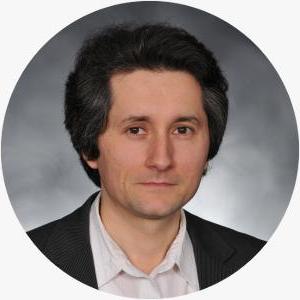
Professor
(802) 735-2615
stefan.balaz@sceduc.net
Dr. Balaz的研究方向是开发用于确定药物处置和受体结合的实验和计算方法. In disposition, 他的实验室使用(1)替代相进行实验测量,以发现膜和甘油三酯相中跨双层运输速率和积累的结构决定因素, and (2) binding to prevalent human proteins such as albumin and extracellular matrix components. The data is used to develop structure-based models for predicting the volume of distribution and other pharmacokinetic characteristics. One of the major goals of this work is to find ways to tailor drug structures for limited distribution, thereby reducing the cytotoxicity of drugs such as those used in treating some cancers or arthritis.

Associate Professor
(518) 694-7387
richard.dearborn@sceduc.net
Dr. Dearborn的研究主要集中在果蝇(Drosophila)发育神经生物学的三个主要领域:1)阐明维生素D3上调蛋白1 (VDUP1)在大脑发育过程中的肿瘤抑制功能, including VDUP1’s role in neural stem cell biology, 2) Hedgehog (Hh)-dependent regulation of VDUP1 in cell proliferation, including how tumor cell-specific differences in Hh signaling affect pharmacological treatment strategies, and 3) Molecular characterization of Eph receptor signaling pathways, which regulate axon guidance, vascular growth, and tumorigenesis. The lab emphasizes molecular-genetic approaches in these studies, each with clinical and translational relevance.

Associate Professor and Director of Research
(518) 694-7238
martha.hass@sceduc.net
Dr. Hass’ research integrates synthetic organic chemistry, pharmaceutical formulation and stability, biochemical assays, medicinal chemistry, and pharmacology. Her laboratory provides training opportunities for students in the areas of drug synthesis, pharmaceutical formulation, topical drug delivery, and assessment of drug efficacy. A major area of focus is the synthesis and activity of new drugs for use as topical agents to treat skin diseases. 一组新的联合药物旨在补充皮肤中的天然抗氧化剂,以增强和延长相对于现有的局部产品的光保护. 其他正在开发的局部药物利用联合药物方法靶向与牛皮癣相关的角化细胞过度增殖和炎症.

Assistant Professor
(518) 694-7260
Pradeepa.Jayachandran@sceduc.net
Antimicrobial resistance (AMR) poses a significant threat to human, animals and the environment. Dr. Jayachandran的主要研究兴趣是了解耐甲氧西林金黄色葡萄球菌(MRSA)抗生素耐药性的遗传基础。, a gram positive pathogen that causes nearly 11,000 deaths each year in the United States alone. Her research focuses on the role of SOS and stress (ROS, antibiotic) response in acquisition of antibiotic resistance in Staphylococcus aureus. Bacterial DNA damage stress response, also known as SOS response, includes a conserved set of genes that are induced under DNA damaging conditions. Among these are genes involved in DNA repair pathway and error-prone polymerases. The increased expression of error-prone polymerase result in increased rate of mutations, which contribute to antibiotic resistance. RecA and LexA are the main modulators of this SOS response. Two main projects in the lab are: 1) Studying the effect of RecA inhibitors on the emergence of antibiotic resistance; 2) Identifying genes that play a role in SOS and stress response using a transposon mutant library. 这些研究将有助于我们了解MRSA的致病性和耐药性机制,并为新疗法的开发提供见解.

Assistant Professor
(518) 694-7175
kideok.jin@sceduc.net
约70%的雌激素受体(ER)阳性乳腺癌患者通过使用各种内分泌疗法,患浸润性乳腺癌的风险显著降低. Despite the relative safety and significant anti-neoplastic and chemopreventive activities of tamoxifen and aromatase inhibitors, many initially responsive breast tumors develop resistance and ultimately recur. 我目前的研究方向是探讨内分泌耐药乳腺癌与肿瘤微环境之间串扰中导致内分泌耐药的分泌组. 我的实验室的长期任务是了解内分泌抵抗过程的步骤,以便开发有效预防和治疗内分泌抵抗性乳腺癌的治疗方法. 我研究的最终目标是将治疗方法引入临床,提高转移性乳腺癌患者的生存率.

Assistant Professor
(518) 694-7332
timothy.larocca@sceduc.net
Dr. LaRocca’s research interest lies primarily in the mechanisms of eukaryotic programmed cell death or PCD. This includes the processes of apoptosis, necroptosis, and the molecular switches that balance the two pathways. Dr. LaRocca is particularly interested in the role of glucose in driving PCD. He is actively investigating the mechanism of hyperglycemic cell death and its role in the exacerbation of ischemic brain injury (stroke). A second project in his lab is an NIH-funded grant aimed at improving understanding of a type of red blood cell death called necroptosis and exploring ways to influence this process. 这项工作的结果有一天可能会改善患有细菌性血液感染和其他血液相关疾病的患者的治疗方法.

Professor
(518) 694-7168
meenakshi.malik@sceduc.net
The long term research goal of Dr. Malik的实验室旨在了解宿主病原体相互作用的复杂性,以开发针对重要细菌感染的改进预防和治疗方法. She has a three-year grant by the National Institutes of Health to investigate the mechanisms by which Francisella tularensis, a category A biothreat agent survives inside the immune cells and suppresses the protective immune responses. 第二个重点领域是研究导致耐甲氧西林金黄色葡萄球菌(MRSA)菌株产生抗生素耐药性的分子机制. Click the following PubMed link for additional information on research projects taking place in Dr. Malik's lab.

Associate Professor
(518) 694-7883
marcel.musteata@sceduc.net
Dr. Musteata's research interests include the development of miniaturized analytical technology for
pharmacokinetic studies and therapeutic drug monitoring, with the purpose of creating personalized therapeutic
devices that integrate chemical analysis, decision, and drug delivery.

Assistant Professor
(518) 694-7343
manish.shah@sceduc.net
Work in Dr. Shah's laboratory involves structural biology. 他目前正在使用结构和生物物理方法研究药物代谢细胞色素P450 (CYP)酶的遗传多态性. CYP's constitute the major enzyme family in drug metabolism, 单核苷酸多态性与氨基酸取代是药物反应的个体差异的重要因素. In brief, 重组蛋白的表达和纯化在实验室进行,以产生结晶所需的CYP蛋白的数量. The crystallographic data is collected remotely, and the three dimensional structure of the protein is then elucidated using computational tools.

Assistant Professor
(518) 694-7116
binshan.shi@sceduc.net
Dr. 她的研究兴趣主要集中在利用先进的分子生物学来了解疾病发病机制的分子基础, virology, molecular genetics, and bioinformatics approaches. Methods used in his lab include a) HIV-1 infectious molecular clone, recombinant virus, and reporter gene technologies to study HIV phenotypes such as infection and replication; b) HIV-1 single genome amplification, sequencing and bioinformatics tools to understand genotype changes and their association with disease progression. Another major area of interest in Dr. Shi’s lab is the design and development of diagnosis assays for detecting infectious diseases, monitoring disease progression, and managing treatments.

Assistant Professor
(518) 694-7368
vir.singh@sceduc.net
Dr. Singh has an extensive scientific background in studying molecular mechanisms associated with HIV pathogenesis, genomic imprinting, molecular biology and mouse models of disease. Dr. Singh的研究兴趣包括调查HIV相关神经系统疾病的潜在分子机制, ii) HIV latency, and iii) Viral infection induced developmental defects. Currently, Dr. Singh’s lab is focused at investigating two projects that come under NIH HIV/AIDS high priority research topics. 项目1:研究HIV(人类免疫缺陷病毒)介导的Sonic hedgehog (Shh)信号下调对脑稳态的影响,特别关注星形胶质细胞和其他脑驻留细胞(脑内皮细胞)之间的异常通信, pericytes, microglia and neurons). Project 2: To characterize select noncoding RNAs for their potential to establish HIV latency via- i) mediating Interferon signaling, and ii) regulating expression of HIV genome by epigenetic mechanisms. Successful completion of these studies will identify novel targets to alleviate HIV pathogenesis as well as pave the way towards HIV cure.

Assistant Professor
(518) 694-7110
eric.yager@sceduc.net
Research in Dr. Yager’s laboratory is focused on understanding how the body regulates inflammatory responses during flu infection. 最近的研究已经确定了多蛋白胞质NLPR3炎性体复合物在流感感染期间宿主防御和病理生理中的关键作用. Specifically, Dr. Yager和他的团队正在研究NLRP3炎性体活化和由此产生的炎性细胞因子分泌是如何在分子水平上调节的,从而有利于宿主保护而不是免疫病理. 其他研究领域包括确定新的目标,以开发新的抗病毒药物来对抗流感感染,以及病毒诱导的炎症在自闭症谱系障碍的病因和发病机制中的作用.

Associate Professor
(518) 694-7895
haian.zheng@sceduc.net
Dr. Zheng’s research group is interested in the design and evaluation of Complex Drug Products (CDP) that are made of botanicals, peptides, and proteins from nature. Interdisciplinary technologies and translational strategies are used to ensure pharmaceutical quality, elucidate mechanisms of action, and evaluate clinical benefits and risks. These efforts can help empower regulatory decisions and enable patient-centric product design. Current projects in the lab focus on assessing the risks and benefits of medical cannabis products. 这包括研究植物和内源性大麻素对大脑和血脑界面(BBI)的影响,以及研究内源性大麻素系统(ECS)对药物传递障碍的影响.

